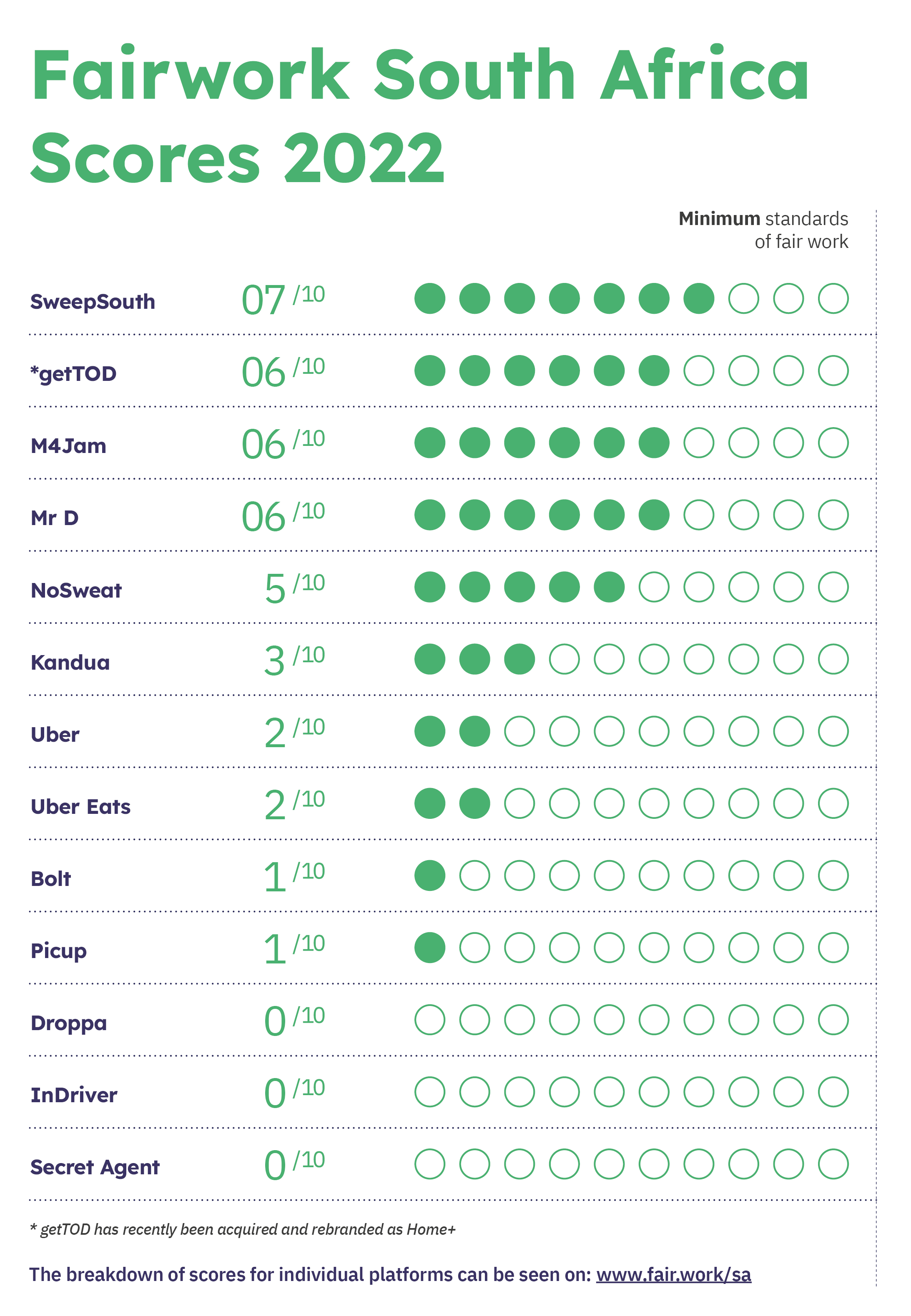New! Fourth Fairwork South Africa Ratings: Platform scores this year have been lower than previous years

The fourth report on working conditions in the South African platform economy, ‘Fairwork South Africa Ratings 2022’, evaluates working conditions at thirteen of the country’s most popular digital labour platforms. This year’s findings also reveal how platform workers continue to be affected by the lingering effects of the COVID-19 pandemic and the current cost of living crisis.
Regardless of sector, most workers reported transportation costs as the biggest contributor to their work-related expenses. Note that as independent contractors, platform workers have to cover all costs associated with their work. With rising fuel prices, some workers reported that their hourly costs exceeded their estimated hourly pay. This extreme situation often leads them to accept more risk in their work. Almost half the platform workers interviewed this year raised safety as one of their main challenges. Delivery and ride-hailing drivers pointed out that the threat of hijacking and assault was a daily worry – a reality brought into focus recently with the murder of Abongile Mafalala, a ride hailing driver in Cape Town.
Overall, platform scores this year have been lower than last year. SweepSouth, M4JAM and NoSweat, which scored 8 points in 2021, have seen their scores drop to 7, 6 and 5 points respectively. Similarly, Uber and Uber Eats have moved from 4 points in 2021 to just 2 in 2022. These changes are partially explained by the adjustments made to the principles of Fair Conditions and Fair Representation for this year’s scoring. While in previous years it was enough for platforms to have a written policy to achieve these points, this year they were asked to demonstrate the practical application of such policies by providing evidence they compensate workers when unable to work and that workers have a real say in their working conditions. None of the platforms studied this year could provide evidence that they satisfied either of these criteria.
To provide an independent evaluation of working conditions in the South African gig economy, the Fairwork team have rated prominent platforms against five principles of fair work: Fair Pay, Fair Conditions, Fair Contracts, Fair Management, and Fair Representation. Evidence collected through desk research, interviews with workers, and platform-provided evidence has been used to determine the Fairwork scores out of ten assigned to Bolt, Droppa, GetTOD, InDriver, Kandua, M4Jam, MrD, NoSweat, Picup, Secret Agent, SweepSouth, Uber, Uber Eats.
Ratings

Key Findings
Fair Pay: 6 platforms (getTOD, Kandua, M4Jam, NoSweat, Picup, SweepSouth) can evidence that workers earn at least the minimum wage (R23.19/hour) after costs. But only 4 (getTOD, Kandua, M4Jam, NoSweat) can show workers earn a living wage (R43/hour). Workers often exceed the legal limit of 45 hours per seven days in order to cover their expenses.
Fair Conditions: 7 platforms (Bolt, getTOD, M4Jam, MrD, SweepSouth, Uber, UberEats) can evidence they protect workers from risks that arise on the job and have a data protection policy. But no platform could evidence they compensate workers for loss of income through illness
Fair Contracts: 6 platforms (getTOD, Kandua, M4Jam, MrD, NoSweat, SweepSouth) could evidence that the contract is clear and accessible and based on South African law. Only 3 (MrD, NoSweat, SweepSouth) can evidence they do not unreasonably exclude liability.
Fair Management: 7 platforms (getTOD, M4Jam, MrD, NoSweat, SweepSouth, Uber, UberEats) demonstrated they provide avenues for workers to meaningfully appeal deactivations and other decisions that affect them. But only 3 could prove they have clear anti-discrimination policies and are transparent about algorithms that determine pay and access to work.
Fair Representation: Being able to freely organise is a key workplace right. But only 3 platforms (getTOD, MrD, SweepSouth) were found to have mechanisms to ensure freedom of association and the free expression of workers’ collective voice. Additionally, no platforms were able to evidence that workers have a say in their working conditions.
The Fairwork Pledge
As part of Fairwork’s commitment to making platforms accountable for their labour practices, we have launched the Fairwork Pledge. This pledge aims to encourage other organisations to support decent labour practices in the platform economy, guided by the five principles of fair work.
Organisations like universities, schools, businesses, investors and charities that make use of platform labour can make a difference by supporting platforms that offer better working conditions.
Organisations have the option to sign up to the Pledge as an official Fairwork Supporter or an official Fairwork Partner. Those signing up to be a Supporter must demonstrate their support for fairer platform work publicly and provide their staff with appropriate resources to make informed decisions about what platforms to use. Becoming a Fairwork Partner entails making a public commitment to implement changes in their own internal practices, such as committing to using better-rated platforms when there is a choice.
The Oxford Internet Institute, The University of Oxford School of Geography and the Environment, The Church of England Diocese of Oxford, the Good Business Charter, The New Economics Foundation and Meatspace Press have already signed the pledge. Join them in demanding a fairer future of work.